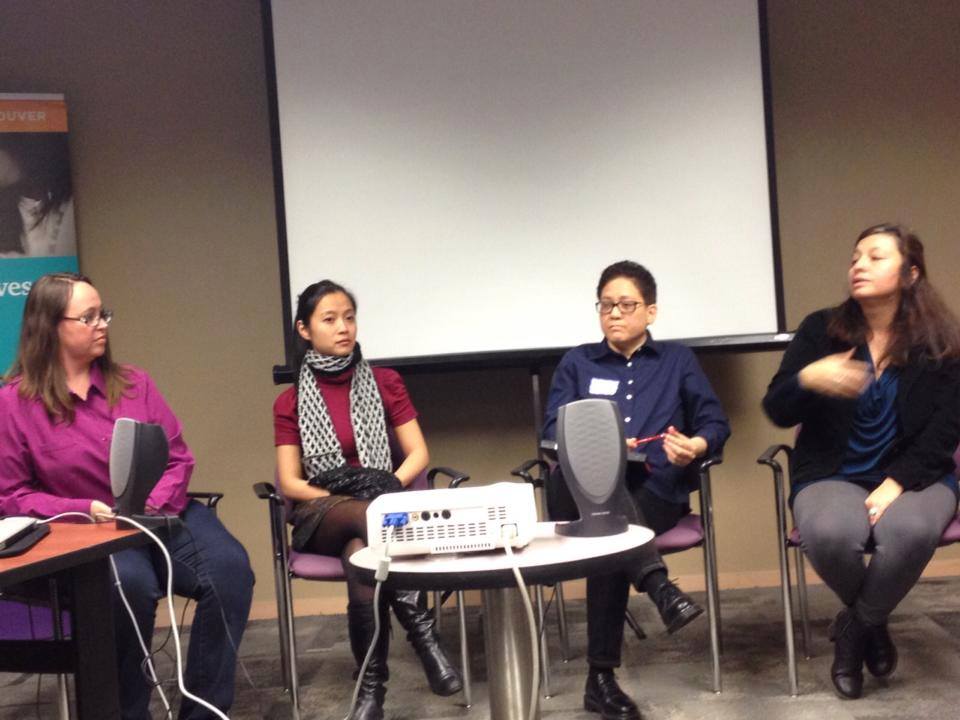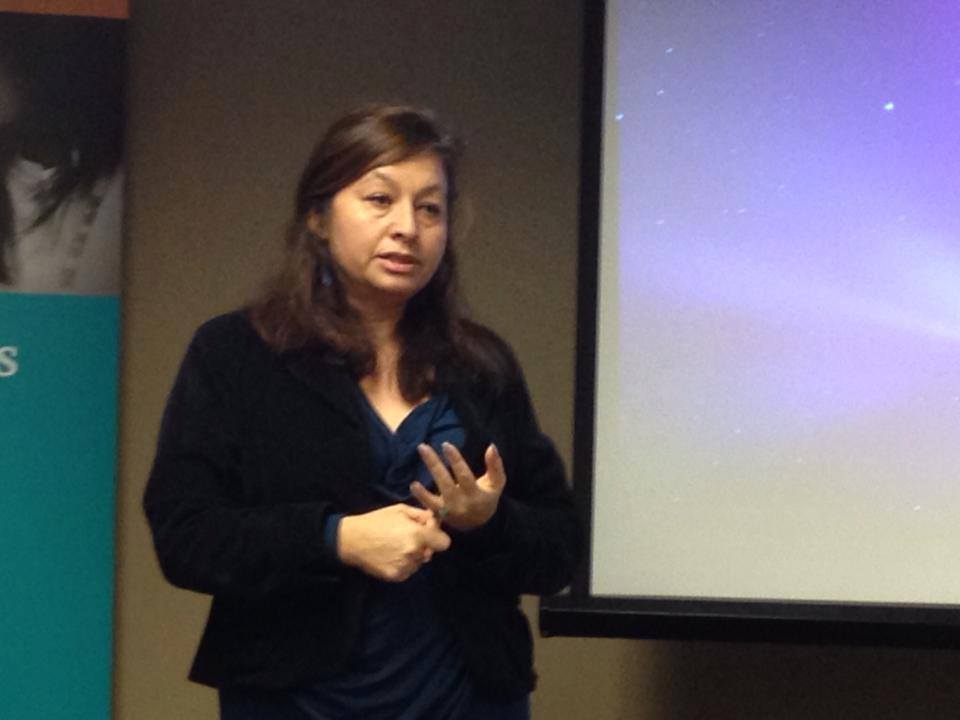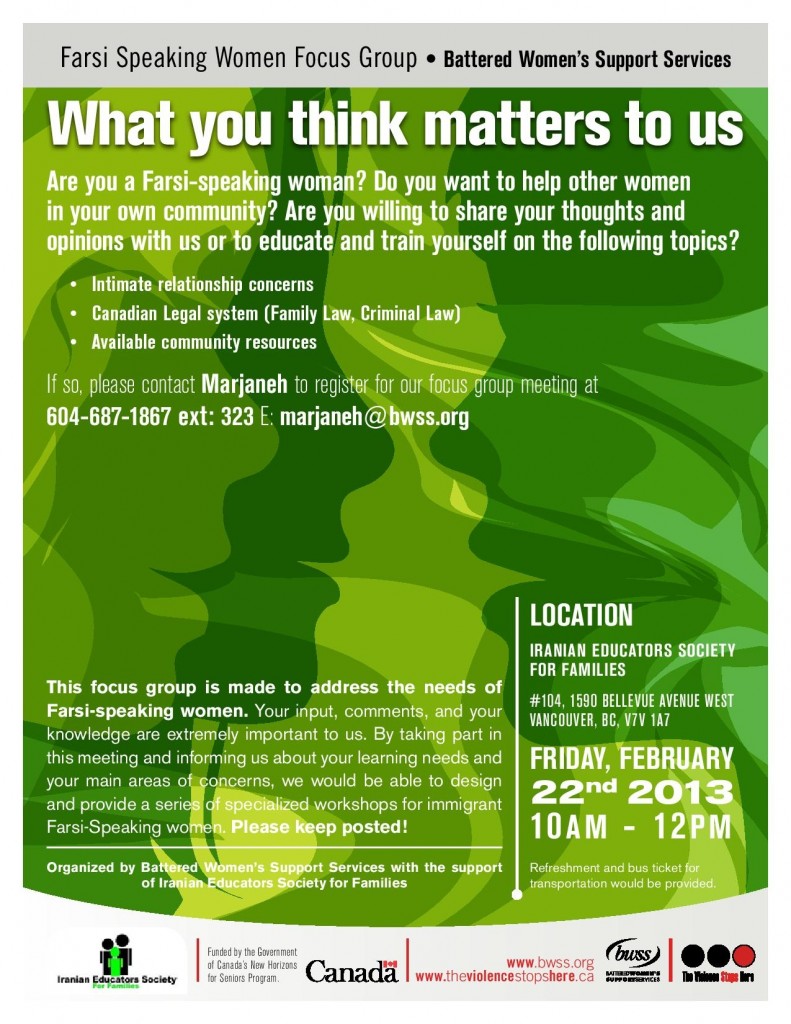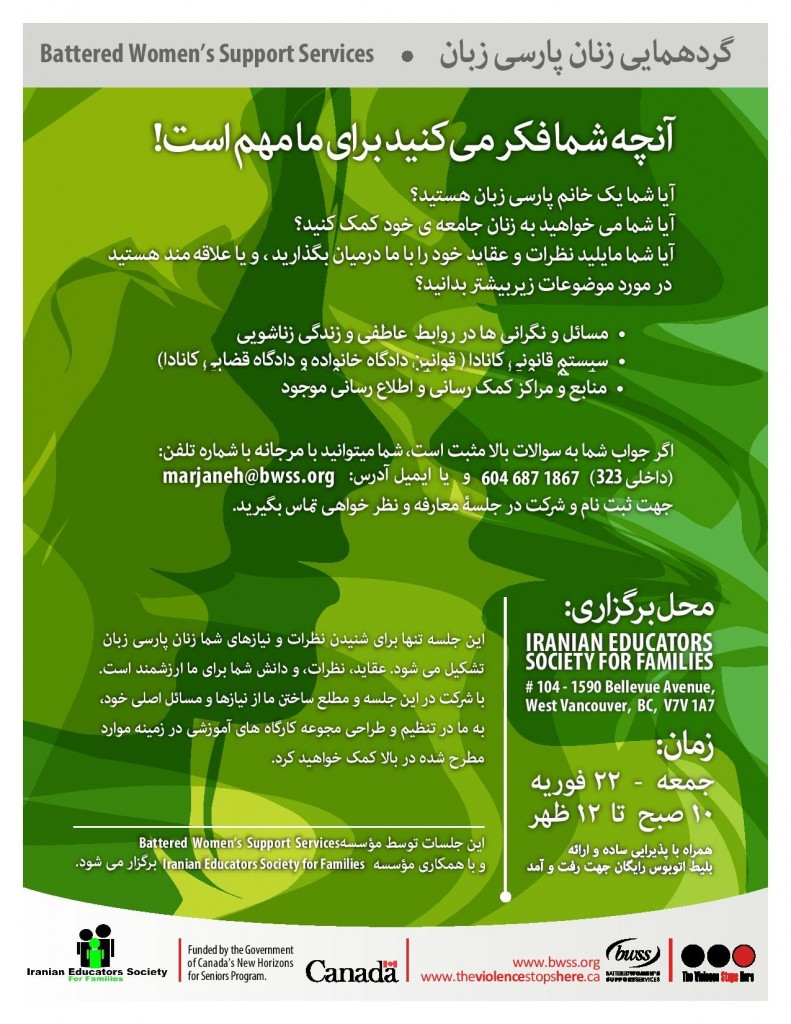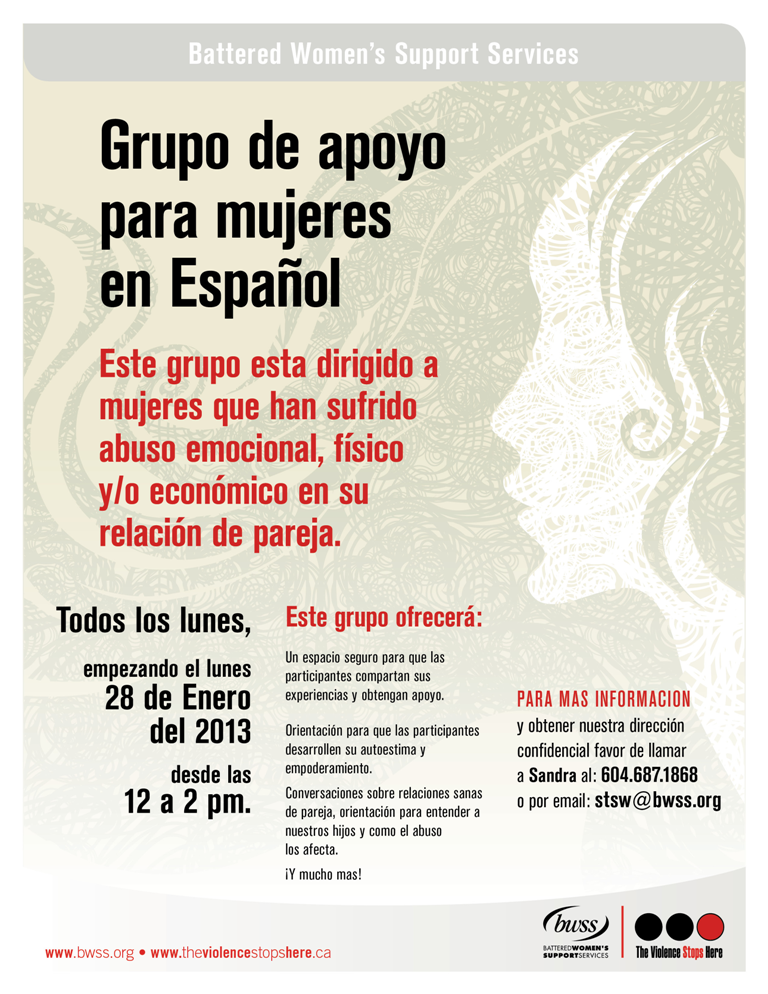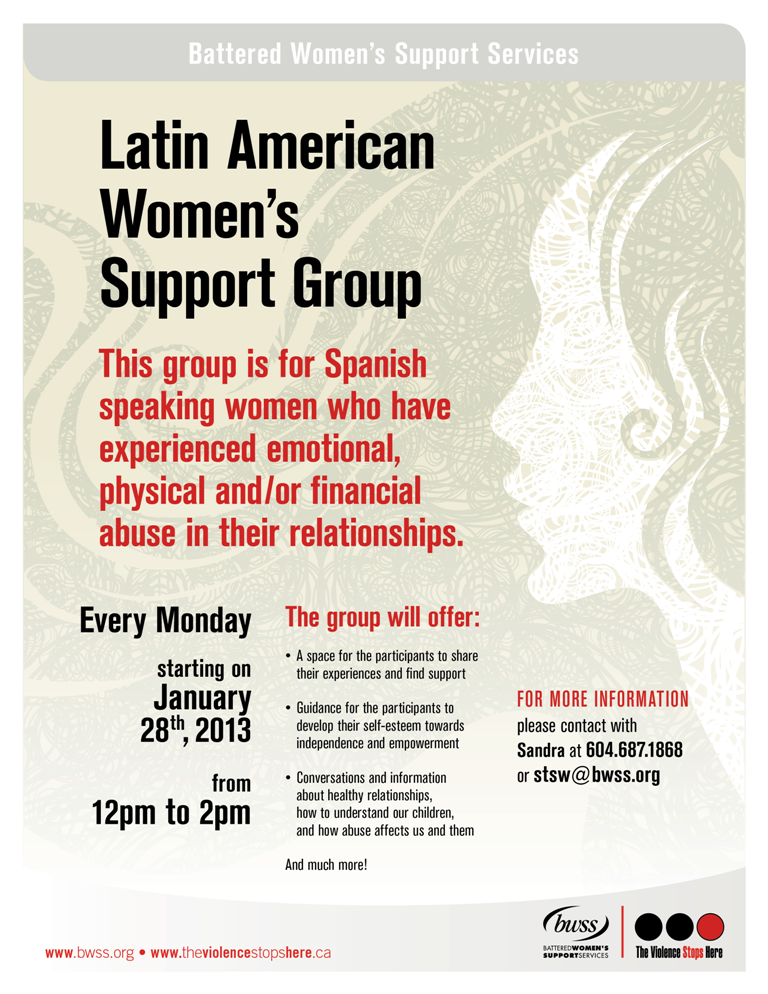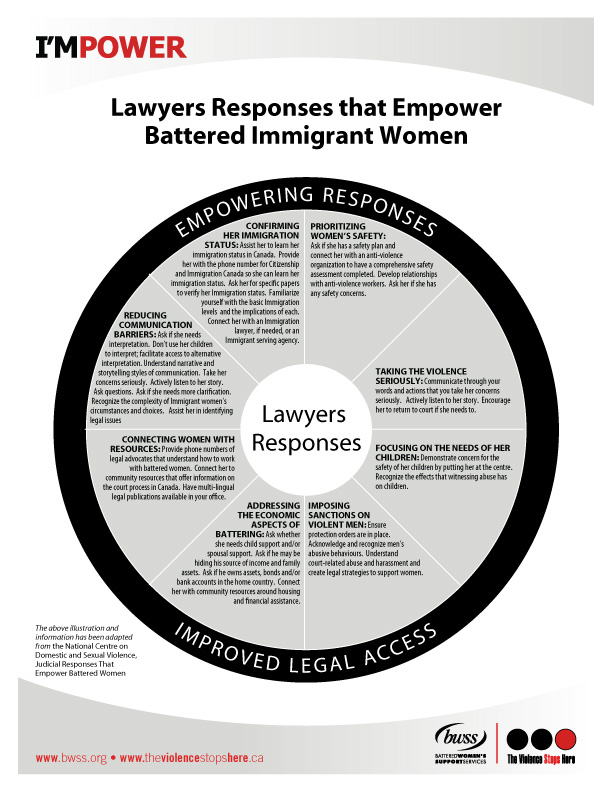Community Forum on Responding to Changes to Immigration Policy: Supporting Non-Status, Refugee and Immigrant Women Survivors of Gender Violence
by Rosa Elena Arteaga, BWSS Manager of Direct Services and Clinical Practices
On November 15th 2013, Battered Women’s Support Services hosted a Community Forum on Responding to Changes to Immigration Policy, in partnership with The Migrant Mothers Project and YWCA Metro Vancouver. Over 50 front-line workers, counsellors, settlement workers, and community activists came together to learn and share knowledge. We reinforced our commitment to continue our collaboration and to increase our networks so we can affect change and attend to the inequalities that migrant women face within Canada’s economic, social, legal and political systems. Inequalities that, more than often, deny basic rights to migrant women and their families.
 Panelists Andrea Vollans, Legal Educator YWCA, Metro Vancouver, Rupaleem Bhuyan, Assistant Professor Factor-Inwentash Faculty of Social Work, University of Toronto, Darla Tomeldan, Legal Advocate, West Coast Domestic Workers Association, Ai Li Lim, Executive Director and Staff Lawyer, West Coast Domestic Workers Association and Rosa Elena Arteaga, Manager of Direct Service and Clinical Practice, Battered Women’s Support Services discussed:
Panelists Andrea Vollans, Legal Educator YWCA, Metro Vancouver, Rupaleem Bhuyan, Assistant Professor Factor-Inwentash Faculty of Social Work, University of Toronto, Darla Tomeldan, Legal Advocate, West Coast Domestic Workers Association, Ai Li Lim, Executive Director and Staff Lawyer, West Coast Domestic Workers Association and Rosa Elena Arteaga, Manager of Direct Service and Clinical Practice, Battered Women’s Support Services discussed:
- The many barriers that women and children with precarious immigration status face in Canada and how we can find safety and support for them
- To learn how recent changes to immigration policy are impacting women and children
- The growing number of mothers without legal status, many of whom have been victims of violence
- How women’s and community organizations across the province are supporting migrant mothers by addressing the systemic oppression that women face
We were very excited to collaborate with the Migrant Mother’s Project, participatory action research project working with community based organizations in Toronto, Ontario to improve the lives of migrant women and their children. The Migrant Mothers Project explores how women with precarious immigration status in Canada seek safety and support from abuse for themselves and their children at times when accessing services is vital to their well-being.
With the aim of understanding women’s migration and gendered violence, first of all, we have to acknowledge that there is a war against girls and women all over the world. From the moment a woman is born and her gender is defined as female, she will be oppressed and discriminated against. Migrant women flee from their countries for many reasons and one of the main reasons is the dismantling of their land. “Women play a significant role in agriculture, the world over. About 70% of the agricultural workers, 80% of food producers, and 10% of those who process basic foodstuffs are women and they also undertake 60 to 90% of the rural marketing; thus making up more than two-third of the workforce in agricultural production.*” Colonization, globalization and the domination of natural resources have taken away women’s land ownership, access to and control over their own land.
Furthermore, force migration is prompted by women’s experiences of gender violence and a broad spectrum of violence that girls and women face through their lives, which includes gender oppression, gender persecution, political persecution, femicide, war, economic violence and the impacts of colonization and globalization.
Women are continually forced to leave their land and migrate to a foreign country where they will be discriminated against based on their social location. Racialized and marginalized migrant women face the most oppressive and unsafe alternatives to flee from their countries and they, are not just simply allowed to enter Canada, they are screened and chosen based on the immigration laws and the policies implemented by the current governmental administration.
Once a migrant woman makes it into Canada, she might have been trafficked-or she might have come as a refugee claimant, through sponsorship, on visitor’s visa, under temporary work permit or undocumented, among other alternatives. Her immigration status will play a huge role on the level of barriers and oppression that she will face as well as the services available to her. Many migrant girls and women will continue experiencing all forms of violence such as physical, emotional, verbal, and sexual abuse from intimate partners, family members or extended family. The process of migration and a precarious immigration status makes girls and women more vulnerable to experience further violence, by the state, by employers, and within their relationships.
With this in mind, we, at Battered Women Support Services support migrant women with precarious immigration status, non-status, refugee claimants and permanent residents who have or are experiencing violence. We are strongly committed to understanding and recognizing that migrant women don’t “just come” to Canada, migrant women flee from their countries under extreme circumstances and with an immense need for support to overcome the impacts of gendered violence, the impact of migration and the complex process of adaptation. We have taken many steps to ensure that we provide the appropriate support but also that we affect systemic change.
We provide support to all migrant girls and women who access our services. Through our feminist, intersectional and decolonizing approach, we recognize that migrant women deal with shared “cultural” as well as individual and unique experiences. This acknowledgment of the collective and individual needs requires caring and compassionate assistance and support. In our work supporting migrant women, we walk along side each woman with an understanding that migrant women face huge social isolation and many structural barriers related to their precarious status and social location.
Our specialized services include but are not limited to:
- Assistance navigating the legal system,
- Including education and information about the Canadian legal system,
- Assistance to access legal support including referrals to lawyers from our selected list of lawyers,
- Accompaniment and support in order to attend refugee hearings,
- Assistance to access basic supports such as food/clothing/furniture, health services, shelters and transition houses, advocacy and support to obtain social assistance, education,
- Information and support about child protection and parenting,
- Language specific counselling and support groups, assistance and
- Advocacy to apply for social housing.
In our experience, migrant women have always faced structural barriers and we have taken action to address those barriers at systemic and individual level. In 2011, we responded to the Balanced Refugee Reform Act (Bill C-11) and exposed the impacts that those changes were going to have on refugee women. In Gender Persecution and Refugee Law in Canada written by Lobat Sadrehashemi, we expressed our concern about making more difficult for women fleeing gender-related persecution to be able to make their stories understood by decision-makers at the Immigration Refugee Board (IRB). We think that there will be many women who slip through the cracks, who do not have access to legal counsel. The current changes on the immigration policies have only increased the structural barriers. These barriers are putting migrant women at risk and depending on an immigration status; they are limited in their ability to access basic services such as health services, income assistance, legal support, and safe shelter. Furthermore, it will limit their right to protection because many migrant women would not call the police and expose the violence they are experiencing for fear of deportation.
We strongly believe that continued access to a full range of programs such as services offered by Battered Women’s Support Services and a strong collaboration among service providers, at municipal, provincial, national and international level, is vital to migrant women’s capacity to overcome the impact of gendered violence, forced migration and adaptation.
http://www.wikigender.org/index.php/Women_and_Agriculture
Last year, Battered Women’s Support Services responded to over 10,000 crisis calls from women and girls to get help and end violence. We could not provide this essential support without your contribution.

